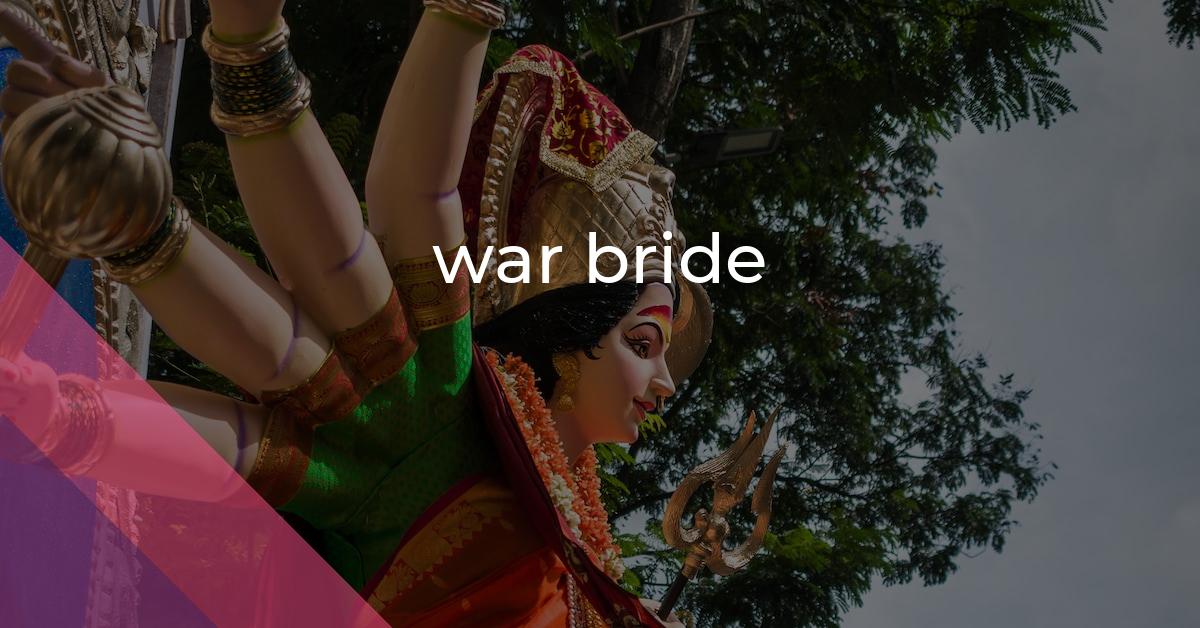war bride: Idiom Meaning and Origin
What does ‘war bride’ mean?
A war bride refers to a woman who marries a soldier from a different country during wartime, often resulting in relocation to the soldier's home country.

Idiom Explorer
The idiom "working girl" refers to a woman who is employed in a job that typically involves manual labor or providing services, often with implications of being in a lower social or economic position.
The idiom "win the battle, but lose the war" means to achieve a small victory or success in a specific situation, but ultimately suffer a larger or more important defeat in the overall context or long-term outcome.
Winning ways refers to the actions, skills, or strategies that lead to success or victory in a particular area or endeavor.
The idiom "widow-maker" refers to something that is extremely dangerous or life-threatening, particularly in a physical or occupational context. It is often used to describe hazards or tasks that have the potential to cause death, especially in male-dominated industries like logging or construction.
The idiom "wide berth" means to keep a safe distance or to avoid getting involved with someone or something. It suggests being cautious and not taking any risks.
The idiom "white sheep" refers to a person in a family or group who behaves or is considered as morally superior or respectable compared to other members. It highlights the contrast between the person's behavior and that of their relatives or peers.
The idiom "whisk away" means to quickly and unexpectedly take someone or something away from a place or situation.
War of nerves is an idiom that refers to a intense and often psychological battle of wills where opponents use mental pressure, intimidation, and manipulation to gain advantage or break the resolve of the other party.
Conquered Hearts
One fact about the idiom "war bride" is that it refers to a woman who marries a soldier during a time of war. The term originated during World War II, when many soldiers from different countries were stationed overseas and married local women. These women were referred to as war brides.
War brides often faced challenges and difficult transitions after marrying soldiers from other countries. They had to adapt to a new language, culture, and way of life, often leaving their families and homes behind. Some war brides also encountered prejudice and discrimination in their new countries, as well as cultural differences within their own families.
War brides were an important part of post-war immigration in several countries, including the United States, Canada, Australia, and the United Kingdom. The immigration of war brides contributed to the shaping of multicultural societies in these countries.
War brides have been the subject of various books, films, and documentaries that explore their experiences and the impact of their marriages. These stories shed light on the personal and emotional journey of war brides, as well as the larger historical context in which they lived.
One important aspect to consider when examining the idiom "war bride" is its historical and cultural significance. The term originated during World War II, when it became common for soldiers from different countries to marry local women while stationed overseas. These unions often formed out of love and companionship between soldiers and the women they met in war-torn countries.
War brides faced unique challenges and transitions as they left behind their homes, families, and familiar cultures to join their soldier husbands in foreign lands. These women had to adapt to new languages, customs, and ways of life, often without the support networks they once had. The process of assimilation was not always smooth, and war brides encountered both personal and societal obstacles in their new countries.
The immigration of war brides played a significant role in post-war societies, particularly in countries like the United States, Canada, Australia, and the United Kingdom. These women brought with them their own cultural backgrounds and traditions, contributing to the shaping of multicultural societies. The stories of war brides, their struggles, triumphs, and experiences, continue to resonate today and offer a glimpse into the complexities of war and its aftermath.
Various works of literature, film, and documentaries have explored the lives of war brides, providing a deeper understanding of their experiences. These stories not only shed light on the personal and emotional journey of war brides but also offer a broader historical perspective on the impact of their marriages. Through these narratives, we can gain insight into the resilience, strength, and adaptability of war brides, as well as the complexities of cross-cultural relationships forged in the midst of war.
War brides, also known as "comfort women" or "comfort girls," went through unimaginable hardships during times of war. The term "comfort woman" refers to women who were forced into sexual slavery by the Japanese military during World War II. These women were subjected to physical and sexual abuse, enduring unimaginable suffering and trauma. Their experiences stand in stark contrast to the voluntary marriages of war brides, highlighting the different forms of exploitation and coercion that can occur during times of conflict.
The expression "take a wife" is also related to the concept of war brides. It refers to the act of marrying someone, often implying a sense of responsibility and commitment. In the context of war brides, soldiers would "take a wife" by committing to a long-term relationship with a woman they met during their time of service. This act of marriage represented a bond and a commitment to support and care for each other in the midst of war and its aftermath.
In delving into the idiom "war bride," we uncover a fascinating and complex history of love, sacrifice, and the human capacity to navigate extraordinary circumstances. The stories and legacies of war brides, including their connections to the idioms "comfort woman" and "take a wife," continue to captivate our collective imagination, reminding us of the enduring power of love, the complexities of war, and the profound impacts of cultural integration.
Example usage
Examples of how the idiom "war bride" can be used in a sentence:
- She met her husband during World War II and became a war bride.
- After the war, many soldiers returned home with war brides from different countries.
- The novel tells the story of a young war bride who moved to a new country to be with her husband.
More "Marriage" idioms



